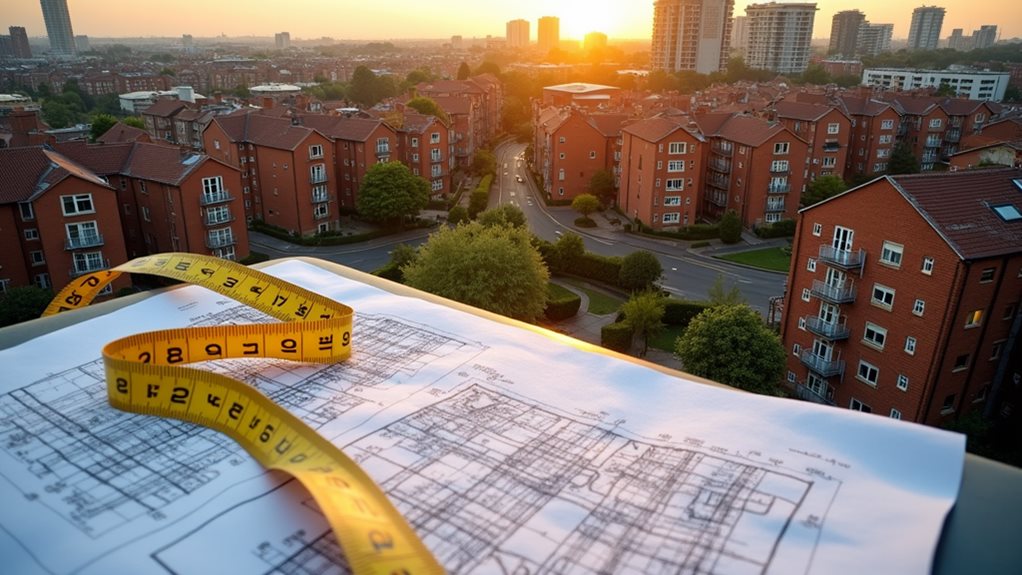Phone:
(701)814-6992
Physical address:
6296 Donnelly Plaza
Ratkeville, Bahamas.

Navigate the nuances of planning permission costs for extensions in Manchester to ensure your project isn't derailed by unexpected expenses. Discover what you need to know!
When you're planning an extension in Manchester, understanding the costs of planning permission is essential. Application fees typically range from £200 to £500, depending on your project's complexity. Small extensions may average around £40,000, while larger ones can reach well over £60,000. Don't forget to factor in additional costs like professional fees for architects, which can add 8% to 12%, and potential expenses for pre-application advice. To avoid delays or unexpected costs, start with a solid budget and thorough planning. If you're looking for more detailed insights into this process, there's plenty more to explore.

Understanding planning permission is essential if you're considering an extension for your Manchester home. It's not just about having a grand vision; it's about maneuvering through the planning regulations that will guide you.
With various application types available, you need to be aware of what's required before diving in. For example, permitted development rights allow you to extend your home by six metres, or eight for detached properties, without needing permission—under certain conditions, of course! However, it's important to note that flats, maisonettes, and similar buildings lack permitted development rights for extensions, which may limit your options. Additionally, understanding the costs of extensions is crucial for effective budget planning.
When you're ready to submit your application, make sure it's complete and includes all necessary documents, as missing details can stall the process. You can easily apply online via the Planning Portal, which simplifies gathering those essential materials.
Keep in mind that extensions must respect your garden space, and the materials should mirror your existing home, helping maintain the neighborhood's character.
As your application moves along, neighbors will get a chance to weigh in, which can feel intimidating but also inclusive. Staying informed about your application's progress will help you feel connected to the process, guaranteeing you're part of a community-focused decision that enriches your home and those around you.
When planning an extension for your Manchester home, several factors can considerably influence the overall costs. First off, application fees are set nationally, and recent proposals suggest an increase from £258 to £528. This fee increase could lead to homeowners being discouraged from seeking necessary permissions, putting them at risk of unauthorized developments.
If you want to get an idea of your specific costs, using online fee calculators can be a helpful tool. Just keep in mind that these higher fees could lead to a rise in unauthorized developments, so staying on the right side of the law is vital.
Next, design costs play a significant role in your budget. Detailed architectural designs aren't just for aesthetics; they're essential for meeting building regulations and ensuring your extension is safe and energy-efficient.
As you plan, consider that construction phase costs will vary based on size and complexity. Additional expenses may arise, especially for kitchens and bathrooms where plumbing and electrical work come into play.
Flooring choices can further shift your budget, depending on material and area.

For homeowners in Manchester, typical costs for extending your property can vary considerably based on the type, size, and location of the extension.
If you're considering a single-storey extension, expect to pay between £1,700 and £1,900 per square metre, with average prices hovering around £54,000 for a standard 4m x 5m space.
Double-storey extensions, offering more room, can range from £60,000 to £150,000, coming in at about £1,500 to £1,800 per square metre.
When it comes to smaller extensions, like a 20m² addition, you're looking at an average of £40,000.
In contrast, larger extensions can set you back anywhere from £55,000 to £150,000, depending on materials and labour costs.
It's worth noting that your extension costs may vary within regions, with areas like Altrincham typically being pricier than somewhere like Bolton.
Keep in mind that additional expenses, such as professional fees for architects and engineers, could add another 8% to 12% to your total project cost.
Understanding these extension types and average prices can set you on the right path for your dream project.
Once you've got a grasp on the typical costs associated with property extensions in Manchester, the next step is steering through the application process for planning permission. This part can feel challenging, but don't worry—it's manageable with the right approach.
Focus on the application specifics and stick closely to the submission guidelines outlined by your local council.
You'll want to prepare for these vital steps:
Once your application is submitted, the local planning authority will quickly do an initial review, usually within 1-2 weeks, to confirm completeness.
After that, your plans will be publicly visible, with neighbors notified. It's important to remember that a committee will assess your application and reach a decision, typically within 8-13 weeks.
Following these steps will help you feel more confident as you navigate this significant journey.

Maneuvering the timeline for planning permission approval is vital for anyone looking to extend their property in Manchester.
First, expect the validation stage to take about 1-2 weeks. During this time, planning authorities guarantee all necessary documents and fees are in order. Missing info can delay your process, so be thorough!
Once validated, you'll enter the public consultation stage, which usually lasts 3-4 weeks. This part is significant, as your proposal will be open to public feedback. Remember, substantial public engagement here may lead to further discussions or adjustments to your plans.
Next up is the assessment and decision stage, where you should anticipate a timeframe of 8-13 weeks. The complexity of your project plays a key role in how quickly the assessment criteria are met. Large-scale developments may require more time, extending the process up to 13 weeks.
During this stage, modifications might be needed, so be prepared to comply with local planning policies.
Finally, once you receive approval, remember that your planning permission typically expires after three years if construction hasn't begun, so act within that timeframe to stay compliant and avoid complications.
Many homeowners in Manchester overlook essential planning aspects when extending their properties, which can lead to serious complications.
You'll want to avoid these common extension challenges to guarantee a smooth process:
To keep your extension on track, prioritize open communication with neighbors and familiarize yourself with local policies.
Address any concerns they may have, and guarantee you secure all required permissions from the outset.
By steering clear of these pitfalls, you'll cultivate a better relationship with your community while safeguarding your investment.
Always remember, a little extra attention today can save you headaches down the line!

Budgeting effectively for planning permission costs is essential for homeowners looking to extend their properties in Manchester. To manage your finances successfully, start by researching the latest fee estimations, given the recent rise in planning application fees. Establishing clear budgeting strategies early on can greatly reduce stress later.
One practical step is to engage with local authorities and professionals beforehand. This will help you anticipate total costs, including design fees, which can range from a few hundred to thousands of pounds. When estimating your budget, consider additional costs that may arise if amendments are needed.
It's worth reviewing the Planning Portal's cost calculator, as it can provide tailored estimates based on your project. Keep an eye on the timeline, too—planning applications generally take around eight weeks to process. Aim to finalize your budget close to the application date so you can adapt to any fee changes.
Regularly reviewing your plans guarantees you remain on track and minimizes surprises. By taking these proactive measures, you'll foster a sense of community with others traversing similar paths while avoiding potential financial pitfalls associated with planning permissions.
While you've laid the groundwork for budgeting effectively, it's important to acknowledge other factors that can impact your overall expenses when extending your home. Even with a solid plan, additional fees and unforeseen expenses can sneak up on you.
Here are some common costs you should factor in:
It's vital to keep these in mind, as they can greatly influence your budget.
Remember, compliance with building regulations, neighbour permissions, or even changing designs can become unforeseen expenses. Engaging professionals who understand the ins and outs can help mitigate surprises, but it's wise to set aside extra funds for those inevitable bumps in the road.
In the end, being prepared guarantees you can achieve the dream extension you envision, without feeling overwhelmed by unexpected costs.

When you're planning an extension in Manchester, it's important to know that fees can vary based on local authority policies and the type of application you choose.
For instance, while an extension application might cost you around £206, opting for full planning permission could set you back at least £403.
Understanding how fees in London stack up against those in Northern councils can also provide valuable context, helping you budget effectively for your project.
Understanding local authority differences in planning permission fees is essential for anyone considering an extension in Manchester or elsewhere in the UK. While the national standard fee for altering or extending a single dwelling is £206, various local authorities may have unique fee structures that can impact your budget.
Here's what you might encounter:
The government sets these fees, but local councils may also adapt them based on the category of development you're considering.
These differences highlight the significance of researching your specific local authority's provisions before you embark on the application process. This way, you can feel confident and informed while planning your extension.
After all, a well-planned project makes for a happy home, and understanding local fees is a key step toward making that dream a reality.
Steering through the planning permission environment reveals that fees are surprisingly uniform across the UK, including London and Northern councils. If you're eyeing an extension, you'll find the planning application fee for homeowners set at a consistent £206, regardless of where you live. This fee transparency aims to foster clarity in the licensing process, promoting application efficiency across the board.
You might notice that recent fee hikes—35% for major developments and 25% for others—are applicable nationwide, eliminating the regional disparity that many would expect. This means whether you're based in bustling London or a charming Northern town, your financial outlay remains the same when it comes to extensions.
As an added layer of assurance, remember that the government has standardized application types and criteria across all councils. The uniform approach not only simplifies the planning process but also helps you navigate the tedious details with less stress.
Getting pre-application advice is essential when planning your extension because it can save you money and time down the line.
By clarifying requirements early on, you can avoid costly revisions and guarantee your application has a better chance of success.
Plus, addressing potential issues upfront helps streamline the entire process, making it smoother for you.
When planning an extension in Manchester, seeking pre-application advice can be a game-changer for your project's budget. This approach not only helps you navigate the complexities of financial planning but also aids in an effective cost assessment. By addressing potential issues early, you can avoid costly mistakes down the line.
Here are some key benefits you'll gain from pre-application advice:
With pre-application advice, you position yourself for a smoother journey. The clarity it provides guarantees that you submit a complete application from the start, ultimately leading to faster determinations by the Council.
Plus, by understanding how your application will likely be judged, you can adjust accordingly, reducing the risk of re-submissions, which can drain your budget. Taking this proactive step not only aligns with your financial planning but helps you feel secure in your decision-making process.
Understanding the requirements for planning permission can seem intimidating, but pre-application advice is invaluable for clarifying every aspect of your project. Engaging with Trafford Council's pre-application service helps you grasp council planning policies and considerations, improving your proposal quality right from the start.
This proactive approach not only increases your chances of receiving planning permission but also identifies critical issues you may face.
As part of the pre-application process, you'll conduct thorough site assessments, research the site's history, and gather necessary documentation requirements. Collecting elevation plans, site layout drawings, and even photographs can create a detailed package that showcases your vision.
You'll also need to pay a fee for pre-application advice, but trust me, it's worth it.
In summary, maneuvering the planning permission landscape for your Manchester extension can be complex, but it's manageable with the right knowledge. Did you know that around 25% of planning applications in Manchester are approved with conditions, highlighting the need for thorough preparation? By understanding the costs and processes involved, and possibly seeking pre-application advice, you can guarantee a smoother journey. With effective budgeting, you're more likely to transform your vision into reality—making that extension a worthwhile investment.